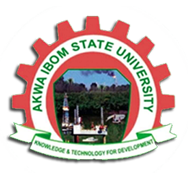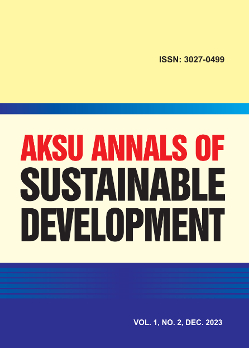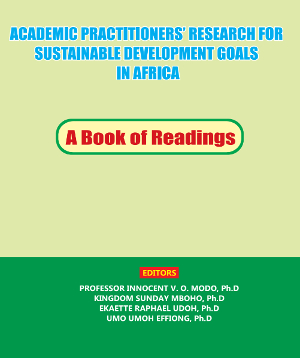EDUCATION & HEALTH EXPENDITURES IN NIGERIA: IMPLICATIONS FOR SUSTAINABLE DEVELOPMENT GOALS
Abstract
NTRODUCTION
Economic growth is attained through the productive use of all resources, including labour, this result in greater per capita income and improvement in people’s average standard of living (World bank, 2004). It has also been argued that meaningful human development depends on policy choices including access to income and employment opportunities, educational and healthcare services as well
as clean and safe physical environment. Human capital theory suggests that society and individuals derive economic benefits from investments in people (Oluwatobi and Ogunrinola, 2011). Education and health play a central role in economic development (Dauda, 2004). They play a central role in development process. No country has successfully achieved continuous growth without significant
investment in human capital (Adelowokan, 2012). The effect of government expenditure spending on human capital development is still an unsolved issue both empirically and theoretically. Quite recently the wealth of a nation is now being measured in terms of human capital and not the stock of physical capital only, as an independent factor of production required to accomplish high and sustainable
labour productivity.
Economic development theorists, especially the neo-classicalist are of the opinion the development in human resources generally has a significant impact on economic growth and development. They opined that the quality and quantity of labour determine production (Okoro 2015). Welfare, being an important indicator for growth and development as given by the Human Development Index (HDI) has identified education and health as one of its measures. Education, good health and longevity are also fundamental inputs for productivity assistance affordable for all the population of countries. Stagnation has been noticed in many developing countries both in health and
education expenditure per capita and economic development, Doucouliagos (1997) has noted human capital as a source to motivate workers, boost up their commitment and create expenditure in research and development (R&D) and eventually pave way for the generation of new knowledge for the economy and society at large.
Downloads
References
Agenor, P.R. and Moreno, D.B. (2006). Public infrastructure and growth: New channels and policy implications. World Bank Policy Research No. 4064
Bakare, A.S and Salami, O. (2011). Health care expenditure and economic growth in Nigeria: An empirical study. Journal of Emerging Trends in Economics and Management Science, 2(2):83-87
Dauda, RO.S. (2004). Health as a component of human capital formation: Does it matter for the growth of the Nigeria economy? Canadian Social Science, 7(4);207-2 18
Dauda, R.S. (2011). Health care spending and the empirics of economic growth. Journal of Society, Development and Public Health, 1, 72-82.
Edame, G.E (2014). Trends analysis of public expenditure on infrastructure and economic growth in Nigeria. International Journal of Asian Social Science, 4(4): 480-491.
Edame, G.E. (2016). Switching regression analysis of public expenditure on infrastructure and economic growth in Nigeria. Multi-Disciplinary Journal of Research and Development Perspectives, 1(1): 29-43.
Menizibeya, O.W. (2016). The Nigerian healthcare system: Need for integrating adequate medical intelligence and surveillance systems. Journal of Pharmacy and Bio Allied Sciences, 3(4): 470-476.
Narayan, P.K. (2015). The saving and investment nexus_ for China: Evidence from cointegration tests. Applied Economics 37: 1979-1990
Nasiru, I. and Usrman, H.M (2012). Health expenditure and economic growth nexus: An ARDL approach for the case of Nigeria. JORIND, 10(3): 95-100.
National Population Commissions (2006). Nigeria: Report on the survey of demographic and health survey. Retrieved from http:www.nigeria/npc/(verified 15 May, 2011)
Njoku, C.0. Ugwu, K.E and Chigbu, E.E. (2014). Government public expenditures: Effect on economic growth (The case of Nigeria, 1996-2013). International Journal of Research in Management, Science and Technology, 2(1): 16-29.
Okoro, A.S. (2015). Government spending and economic growth in Nigeria. Global Journal of Management and Business Research Economics and Commerce, 13:1-7
Olajide, 0.T. Akinlabi, B.H. and Tijanim A.A. (2013). Agricultural resource and economic growth in Nigeria. European Scientiftc Journal, 8(22): 103-115.
Oluwatobi, S.O and Oguririnola I.O (2011). Government expenditure on human capital development: Implications for economic growth in Nigeria. Journal of Sustainable Development, 4(3): 72-80
Oni, L.B. Aninkan, O. O. and Akinsanya T.A. (2014). Joint effects of capital and recurrent expenditures in Nigeria's economic growth. European Journal of Globalization and Development Research, 9(1):530-543.
Downloads
Published
Issue
Section
Categories
License
Copyright (c) 2024 AKSU Annals of Sustainable Development

This work is licensed under a Creative Commons Attribution-NonCommercial-NoDerivatives 4.0 International License.
Manuscript content on this site is licensed under Creative Commons Licenses. Authors wishing to include figures, tables, or text passages that have already been published elsewhere are required to obtain permission from the copyright owner(s) for both the print and online format and to include evidence that such permission has been granted when submitting their papers. Any material received without such evidence will be assumed to originate from the authors.





 ICIDR Publishing House
ICIDR Publishing House